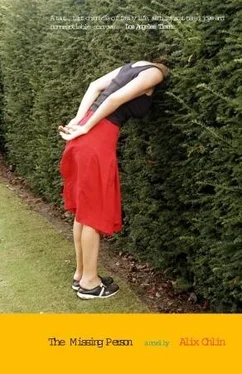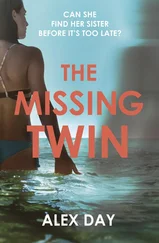“A motel it is,” Angus said.
We drove back to another brown room, with brown wallpaper and a brown flowered bedspread. I took a long, hot shower. When I came out, he was asleep face-down on top of the bedspread, his arms spread wide to either side. I turned on the TV and watched a silent version of a sitcom from my childhood, Angus snoring gently, but I felt restless. I picked up his keys with the vague idea of going out to get us something to eat. The parking lot smelled strongly of baking asphalt and exhaust. I got in the van and glanced in the back at milk crates stuffed wildly with tools, which Angus, apparently, had emptied out of the toolbox for our picnic. There were wrenches and hoses and a plumber’s snake and some other tools I didn’t recognize. Which is why it took me a moment to notice the gun. It was stuffed in a crate with no regard for safety, and I grabbed its long barrel and pulled it out.
Then I went back into the motel room and shook Angus awake. “Why do you have this?” I demanded.
He rolled over, his freckled face creased by the polyester bedspread. “What are you talking about?”
“A gun. You have a gun. You have wads of cash and a gun.”
“This is New Mexico. Everybody has a gun.”
“I don’t have a gun.”
“You do right now,” he pointed out. “And I wish you wouldn’t wave it around.”
“Explain this to me.”
“Fine,” he said. He rolled to his side, quicksilver fast, and he had the gun out of my hand before I knew what was happening. He pointed it at the wall and shot, the gun making a surprisingly docile sound. I walked over to the wall and saw a BB embedded in the brown wallpaper, small and silver as an earring.
“I’m a peaceful person,” Angus said, “but I spend a lot of time alone in the desert, and going alone into people’s houses. Sometimes it helps to look less peaceful than I am.”
“Oh,” I said, rubbing my fingers over the bubble of the BB in the wall. When I turned around to apologize, he was asleep and snoring again, the gun dropped to the floor.
I lay down next to him and listened to the drone of traffic from the highway, the shuffling noises people made as they moved in and out of rooms. The occasional rustle of Angus moving. The rhythm of his breath.
Here’s what I learned in the flat hot days of early July: Angus loved his work. He left each day in the purple van, whistling as he went, his coveralls shining whitely, like movie-star teeth. He came home grinning with exhaustion and scrubbed himself clean with the rough towels of whatever motel we were occupying. In the evenings he washed his coveralls with bleach at a laundromat and folded them carefully. He seemed to get paid well and in cash, with which he paid our room bills. I had no urge to go back to Wylie’s, and Angus, apparently, didn’t mind. He kept whatever he needed in the van, and if he went back to the apartment he didn’t tell me about it. When we craved a change of scene we moved to some new dive, off the highway where the truckers stayed, or downtown, where our shiftless neighbors lounged all day on their balconies, drinking Tecate and watching the cars go by.
“When the water stops,” Angus told me at night as we lay in the sheets holding hands, “everything stops. And when the toilet doesn’t work, people can’t even stay inside their homes. They stand outside wringing their hands, waiting for the van to come down the street. They never think about plumbing until it goes away, and then—” he laughed—“panic.”
“So you like the panic, or calming the panic?” I said.
He laughed again. “Both.”
I thought about going back to the condo, but couldn’t bear the idea of staying there. I did slink back once, when I knew my mother would be at work, and took the Caprice. Every couple of days I left her messages, also during the day, saying I was fine. The machine always played her cool recorded voice telling me to leave my name and the time of my call, and I assumed, since she never changed this recording, that she wasn’t very upset by my disappearance. She was probably relieved, I thought, after the dinner party and my rudeness to and about David Michaelson, not to see me for a while. I didn’t know where Wylie was, and judging by the way he’d bolted from the condo without turning around when I called his name, I didn’t think he wanted to know where I was, either.
One day when Angus was off plumbing the depths, as he liked to say, of Albuquerque’s soul, I shook myself free from the spell of cable television and went back to the UNM library to check my e-mail. There was a message from Michael saying exactly what I’d expected.
Dear Lynn,
Delighted to hear that you’re having such a terrific time of it in New Mexico; I hope the state’s much vaunted natural beauty continues to inspire. I always knew that given the right topic your talents as a scholar would rise to the fore. It almost makes up for your absence here in Paris.
I would suggest you collect all available biographical data on this painter of yours, and make the strongest possible case for the lineage and context of the work. Also, work on a detailed formal analysis of the two paintings and relate them to her contemporaries, both male and female. Your final two months of fellowship work should be extremely productive. I look forward to reading your work.
Cheers,
Michael
This was quintessential Michael, cheerful and dismissive at the same time: the slightly patronizing remark about New Mexico’s natural beauty implying, by omission, its lack of cultural substance. (My first six months in grad school, he’d flirted with me by asking, practically every time we met, whether I liked New York better than Arizona; then he would stand back, his lip slightly curled in anticipation, and wait for me to correct him.) The backhanded compliments suggesting both that he had faith in my talents and that I had yet to actually demonstrate them. The quick forgiveness of my standing him up making clear how little he was hurt by it. His reminder that I had only two more fellowship months left, and no more institutional support after that. And then cheers.
I gritted my teeth and set to work. I pictured the two desert paintings in my mother’s house, turning the images over in my mind. There was a certain amount of suppressed violence in both paintings. In The Wilderness Kiss, no actual kiss was depicted, yet the painting was clearly sexual; its arrangement of bodies, with the woman’s legs wide open, hinted that something wild was about to happen. The same was true of The Ball and Chain, in which the same woman lay collapsed and prostrate on what seemed to be her own son. They really didn’t seem like paintings a secretary would buy on behalf of her boss, and it was even harder to imagine my father choosing them as an appropriate gift for his wife. Then again, it was the seventies, and maybe things were different then, even in Albuquerque. In any case, I needed to find more about the real Eva Kent, where that violence had come from and what I could make of it.
I spent the next few days searching for her in online sources, phone books, real-estate listings, school records. It was mind-numbing and time-consuming, but I liked it, even the paper-cut dreariness of it, for the form it gave to my days. I ran into problems, however. There were Kents in Santa Fe and Las Cruces and Albuquerque, and none of them were Eva. Nor did any of them know any Evas. I got hung up on, most of the Kents assuming I was a telemarketer choosing names at random and harassing them.
“Eva? I told you my name was Ed! Leave us alone!”
“Is this the collection agency again? I already said we don’t got no money.”
Читать дальше












